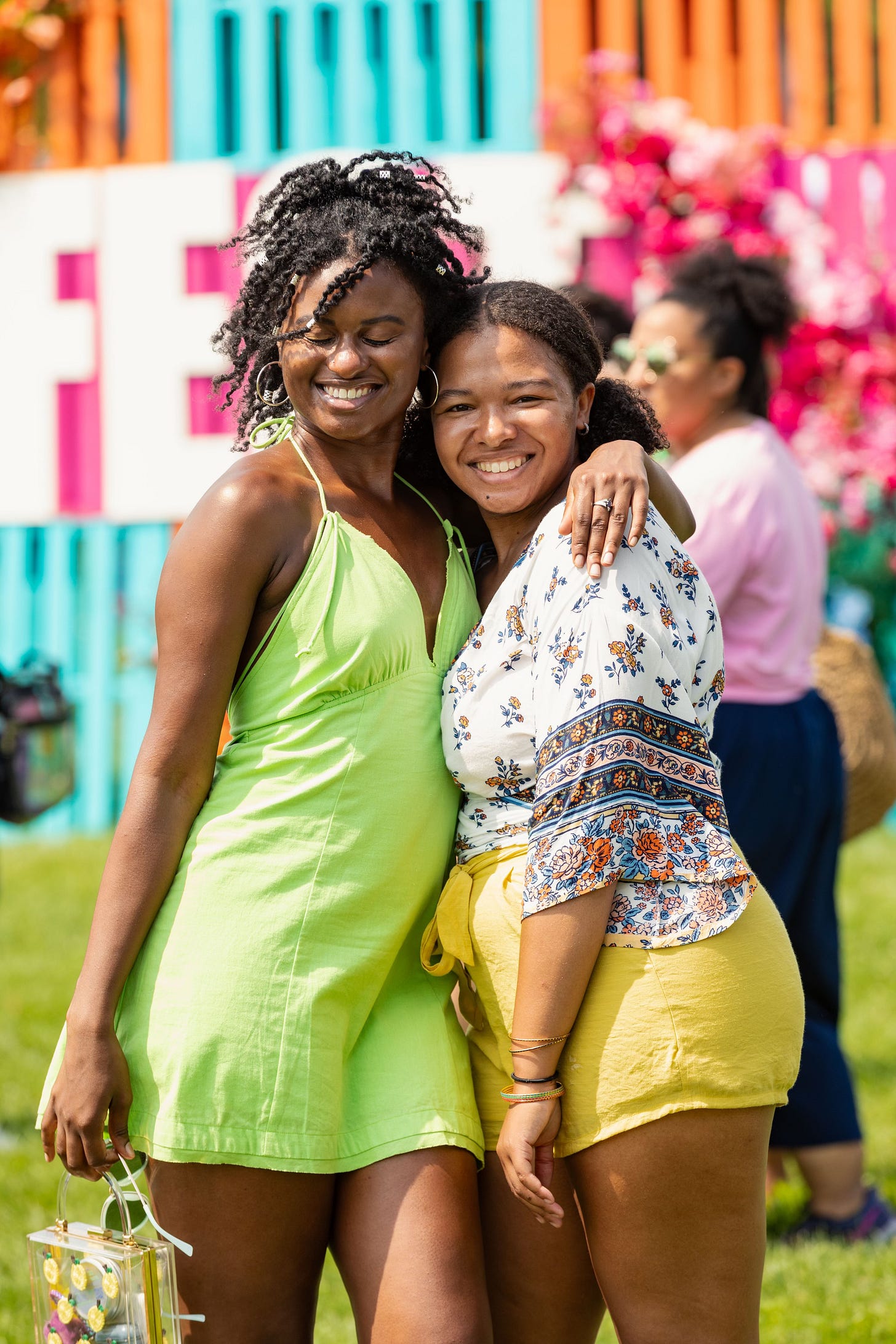
I went to CurlFest last weekend, and it could be a great moment to think about my curl journey and reflect. The festival was on hiatus through the pandemic. Last Saturday was the first time Black folks came to Randall’s to celebrate their natural hair since 2019. CurlFest, only in its ninth year, feels like a given.
Randall’s Island Park transformed from a sprawling grassy lawn into a destination for Black expression. Black girlies adorned their fros with flower crowns and butterfly clips, saved their skin from the beaming sun with parasols, and fluttered from food trucks to small business vendors and back to the hair and beauty marketing tables. The range of styles and expressions of Blackness made my heart warm. An alternative Black girl wore a plaid skirt with matching suspenders; a group of friends celebrated a bachelorette weekend with matching shirts and sashes as they picnicked; and over by the stage, where the DJ and hosts danced to our cookout faves, a small crowd watched folks double dutch. The festival was wholesome Black Girl Magic fun, to say the least.
Watching the children have fun all day with their guardians and family was also healing. To grow up as a Black girl in this country is to struggle with your hair. Fixating on hairstyles (relaxed, weave, sew-in, braids, wash-and-go) and managing other folks’ reactions to those styles probably takes away an hour out of the day for many Black women and girls. These societal expectations, perceptions, and internal emotions take a toll on the psyche in a society built to prioritize Eurocentric beauty standards.
This reality sparked endless discussions, debates, and cultural movements since the US’s founding. Madam CJ Walker’s career, Black is Beautiful in the late 60s into the 70s, and the natural hair movement in the mid-2010s are examples, along with countless songs, novels, tv, and film grappling with the topic. At this point, Black women grappling with their hair, beauty, and desirability is a literary trope and phenomenon that some scholar has undoubtedly written a dissertation, article, or book about.
In high school, I remember wanting to explain how Black women face legal discrimination and interpersonal oppression because of their hair. As a part of the diversity club, I wanted to explore hair for our assembly one year. Being in an all-girl, predominately white school, I thought hair might be a relatable topic that could open my classmates up to issues they hadn’t considered. It was senior year, and I just finished reading The Bluest Eye by Toni Morrison. Reading about young Pecola struggling because she didn’t have the same blue eyes or shiny blonde ringlets as Shirley Temple opened up a wound I had let fester.
When I told my sister about the idea, she helped to connect me with a mentor of hers who helped design an all-school assembly about that subject that converted the Doll Test, beauty standards, and discrimination in an accessible way. The other Black girls in the club were also on board with an opportunity to discuss a topic that was dear to us all. When we brought the idea and proposal to our faculty advisor, an Irish-Catholic religion teacher with thin blond hair, she dismissed us, saying that struggling with feeling insecure about your hair isn’t particular to Black girls. “Everyone wishes they had hair like someone else,” she said.
Although tempting to dismiss discussions about natural hair as trite, cliche, or unnecessary, this is not the moment to cease creating spaces and moments to discuss hair discrimination in the workplace or school, representation in media, and beauty standards. Hair discrimination legislation, often called the CROWN Act (Creating a Respectful and Open World for Natural Hair Act), first adopted in California in 2019, has only been passed in about 20 states and failed to become national law at the end of 2022. Given the Supreme Court’s overturning of Affirmative Action, potentially affecting hiring practices and higher education, discussions about Black people’s hair are still important and must be shared widely.
What’s your natural hair story? What are your favorite songs, tv shows, novels, poems, etc. about natural hair? Please share in the comments!
Rapid Fire Hair Thoughts
📺 Beauty Shop by Queen Latifah; Viola Davis Removing her Wig Season 1 Ep 4 of HTGAWM; Chris Rocks’ Good Hair Documentary
🎶 Music Videos for Say My Name by Destiny’s Child and Getting in the Way by Jill Scott, and the playlist below.
📚 The Bluest Eye by Toni Morrison, Well-Read Black Girl Anthology, You Can’t Touch My Hair by Phoebe Robinson, My Beautiful Black Hair by St. Clair Detrick-Jules



